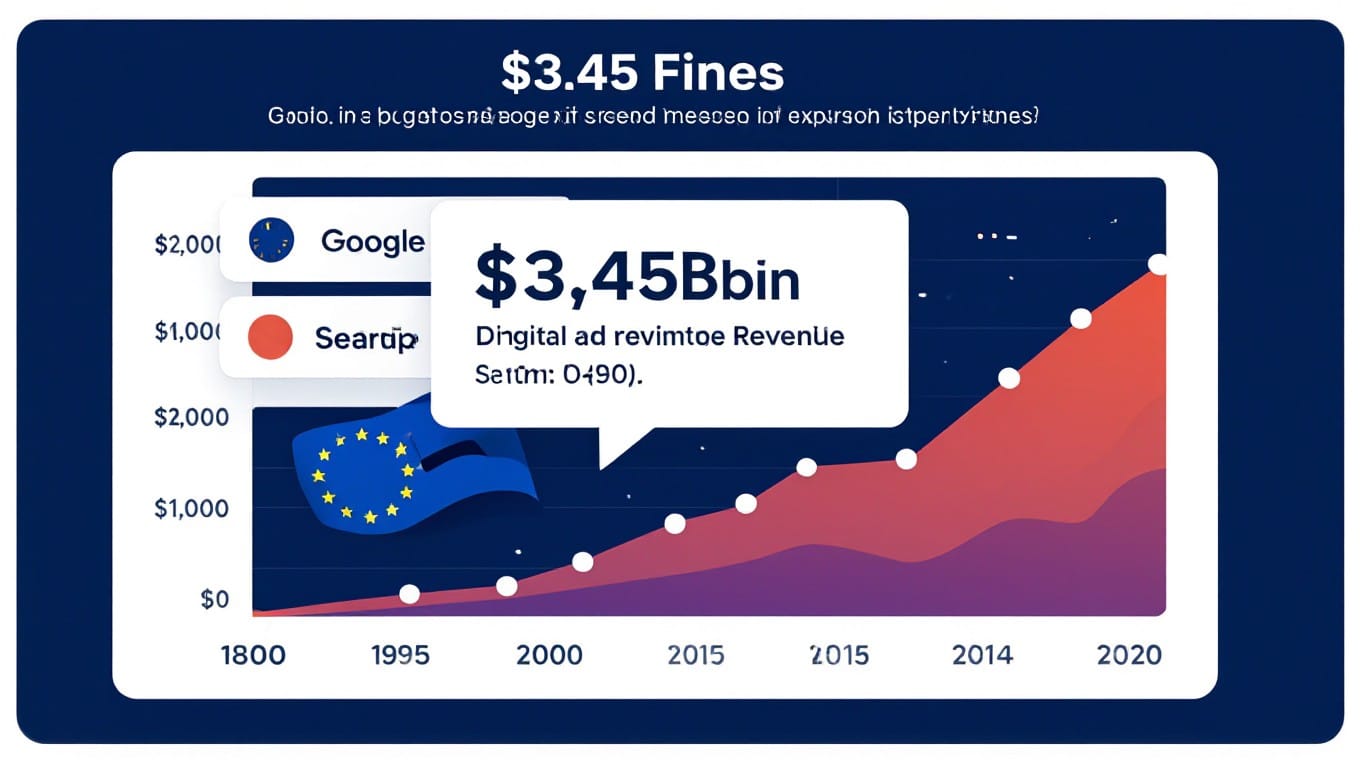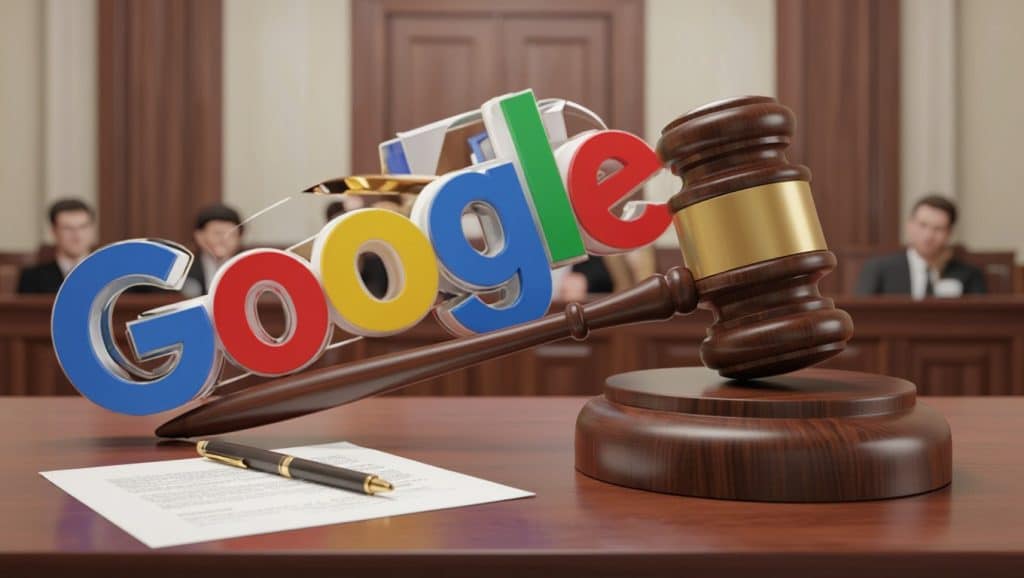The Eye-Watering Fine: Google’s €2.95 Billion Reckoning
Sanction and Rationale
According to Reuters, the European Commission imposed a €2.95 billion ($3.45 billion) antitrust fine on Google for abusing its dominant position in the adtech stack, finding that Google used restrictive contractual terms and technical measures that disadvantaged rival ad servers and exchanges and amounted to anti-competitive practices.
Complaint and Legal Status
The sanction was triggered by a formal complaint to Brussels and follows a multi-year investigation; Reuters reports that Google has announced it will contest the decision and the matter is now an ongoing legal battle before EU courts, a development you should track if your business relies on digital advertising infrastructure.
What We Know:Google was fined $3.45 billion by the European Union for violating adtech antitrust laws. This record penalty highlights concerns about Google dominating digital advertising, limiting competition, and unfairly controlling ad auctions and data usage for publishers and advertisers.
Behind Closed Doors: The Complaint that Triggered the Fine
Reuters reported the antitrust action followed a formal complaint alleging Google used its integrated adtech stack to prioritize internal services, undermining rival demand-side platforms and supply-side partners. The European Commission ultimately imposed a $3.45 billion antitrust fine after finding evidence that these practices harmed competition in digital advertising markets.
Documentation from the probe showed a multi-year investigation and administrative procedure that escalated once the complaint gained traction; you should expect Google to pursue an appeal, extending the ongoing legal battle, Reuters noted.
European Publishers Council’s Stand Against Google
Reuters reported the European Publishers Council lodged the complaint, arguing Google’s conduct reduced transparency and depressed publisher revenue by routing bids through its own exchanges and privileging in-house tools over independent adtech providers. You are presented with detailed submissions from publishers and industry analyses that the council used to support claims of anti-competitive practices.

Political Climate: Scrutiny from the U.S. President
Reuters reported the case unfolded amid public scrutiny from the U.S. President, who raised concerns about Big Tech market power and sought briefings on EU enforcement actions related to adtech. This attention amplified scrutiny and framed the issue as relevant to broader transatlantic regulatory objectives.
Parallel interest from U.S. authorities was noted by Reuters, with regulatory and enforcement bodies in the United States conducting separate probes into Google’s adtech practices, creating a context of cross-border enforcement coordination you should watch as the matter proceeds.
Specifically, Reuters indicated presidential attention increased diplomatic and regulatory communications between Washington and Brussels, a dynamic that may influence timelines and strategic responses as Google moves forward with appeals and as regulators exchange information.
A History of Confrontation: Google’s Antitrust Journey in the EU
EU competition authorities have pursued a sequence of enforcement actions against Google over the last decade, with notable outcomes including a €2.42 billion antitrust fine in 2017 for search advertising practices and a €4.34 billion fine in 2018 over Android tying, and now the decision that Google Fined $3.45B by EU for Adtech Antitrust Violations as reported by Reuters. You should view the adtech ruling as the latest enforcement milestone in a pattern where regulators focus on market structure, data access, and auction mechanics rather than isolated contractual terms.
Regulatory escalation often followed complaints from publishers, adtech rivals and industry groups, with formal probes opening after documented market complaints and evidence gathering. You can expect Google to pursue legal challenges as it has with prior penalties, prolonging review at the General Court level while EU authorities consider remedies and compliance monitoring (Reuters).
Recurring Regulatory Battles: Key Milestones
Major milestones include the 2017 shopping-services fine for favouring Google’s comparison service, the 2018 Android penalty for tying Google services to device makers, and the recent adtech sanction focused on auction design and data flows. Each case targeted distinct aspects of platform power: search display, mobile OS bundling, and now programmatic ad stacks where control over real-time bidding and data integration was central.
Follow-up actions have ranged from hefty antitrust fines to orders for behavioral remedies or interoperability measures; regulators increasingly demand changes to data access and auction transparency so third parties can compete. You will notice that enforcement has moved from product-specific rulings to systemic scrutiny of how dominant platforms leverage data across adjacent markets (Reuters).
Implications of Google’s Adtech Practices
Adtech enforcement affects publishers, advertisers and competing ad-tech vendors by targeting how real-time bidding, header bidding alternatives, and data-sharing are implemented; the EU found that certain integrations created anti-competitive barriers that advantaged Google’s own buying and selling tools. You should expect increased regulatory oversight aimed at restoring competitive access to the ad stack and limiting preferential treatment within auction mechanics.
Additional implications include potential requirements for greater transparency on bid routing and fee structures, mandated data portability for publishers and advertisers, and monitoring of Google’s compliance with remedies. You will likely see continued litigation and phased remedies as the Commission balances effective market correction with operational continuity for digital advertising stakeholders (Reuters).
The Bigger Picture: Google’s Market Footprint Post-Fine
You should note that the $3.45B antitrust fine reinforces regulatory pressure on Google’s adtech stack and signals heightened scrutiny of alleged anti-competitive practices in digital advertising (Reuters). Market observers frame the ruling as part of a broader enforcement trend that could force product-level changes and additional compliance costs for Alphabet.
Regulatory action was triggered by a complaint and forms part of an ongoing legal battle that you will see reflected in both litigation timelines and product adjustments; remedies could include technical interoperability requirements or sales restrictions that reshape adtech market dynamics (Reuters). Expect continued monitoring by investors and competitors as appeals and potential remedies progress.
Current Market Performance: Stocks Snapshot
You likely noticed short-term market reactions after the ruling, with trading volume rising and shares exhibiting increased volatility on the announcement day; Reuters reported modest intraday declines as investors reassessed near-term legal and compliance costs. The fine size is material but small relative to Alphabet’s overall revenue base, which tempered immediate market damage (Reuters).
Analysts stress that your view of Alphabet should account for diversified revenue streams—Search ads, YouTube, and Cloud—which provide buffer against single-event shocks, though adtech-specific margins could compress if structural remedies are imposed. Watch quarterly guidance and ad revenue trends for concrete signals about longer-term impact (Reuters).
The Fear & Greed Index: Investor Sentiment
Investor sentiment metrics, including gauges like the CNN Fear & Greed Index, shifted toward greater caution in the immediate aftermath, reflecting a brief move to risk-off positioning as traders priced in elevated regulatory uncertainty (Reuters). That shift translated into sector-wide rebalancing rather than a targeted sell-off confined solely to Alphabet.

Final Thoughts: What This Fine Means for Google and the Future of Adtech
Immediate implications for Google and market participants
The European Commission imposed a $3.45 billion antitrust fine on Google for alleged anti-competitive practices in the adtech stack, Reuters reported under the headline “Google Fined $3.45B by EU for Adtech Antitrust Violations”. You should expect compliance costs and contract renegotiations as Google implements regulator-ordered remedies; advertisers and publishers may face short-term operational changes to bidding, data flows, and inventory access.
Wider effects on adtech regulation and competition
The penalty was triggered by a complaint and follows an ongoing legal battle, Reuters noted, signaling stricter enforcement across digital advertising. For your procurement and strategy, that likely means increased transparency requirements, potential interoperability mandates, and heightened regulatory scrutiny that could reshape platform fees and third-party exchange dynamics over the next 12–24 months.
Frequently Asked Questions About Google’s $3.45B EU fine
What was the reason for Google’s $3.45B EU fine?
Google was fined for antitrust violations in its adtech business, including restricting competition in digital advertising auctions and using data unfairly against competitors.
How does this fine impact digital advertising?
The fine increases scrutiny on adtech practices, potentially reshaping digital ad auctions, publisher revenue, and competition in online advertising markets.
Can Google appeal the EU decision?
Yes, Google has the right to appeal the decision to the European Court of Justice, which could delay enforcement or alter the penalty.
Which companies benefit from this ruling?
Smaller adtech companies and publishers could gain more competitive opportunities as Google may need to adjust its dominance in the adtech ecosystem.
Has Google faced similar fines before?
Yes, Google has faced multiple EU antitrust fines in the past, including for Android, Shopping, and AdSense-related practices.
How to Respond to Google’s EU Adtech Antitrust Fine
Learn how to understand and respond strategically to Google’s $3.45B EU adtech antitrust fine, protecting your advertising interests and business strategy.
Step 1: Analyze the EU Ruling
Carefully review the official European Commission documents to identify which adtech practices were penalized and how this affects digital advertising markets.
Step 2: Evaluate Your Business Impact
Assess how Google’s fine may influence your ad campaigns, publisher revenue, and partnerships with Google’s adtech ecosystem.
Step 3: Explore Alternative Ad Platforms
Consider diversifying your digital advertising across other platforms or adtech providers to reduce dependence on Google.
Step 4: Monitor Legal and Regulatory Updates
Stay updated on Google’s appeals or new EU regulations that may affect adtech compliance and digital advertising strategy.
Time Required: Approximately 4 hours
Estimated Cost: 0 USD (information review and strategy planning)

